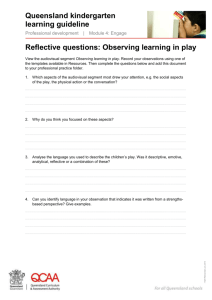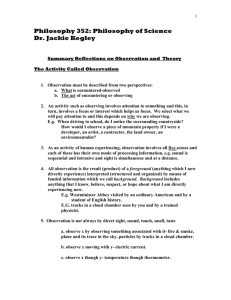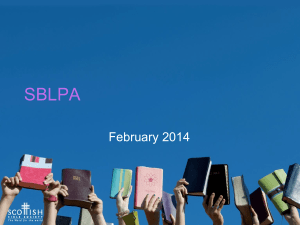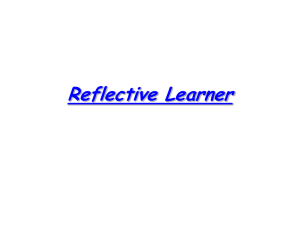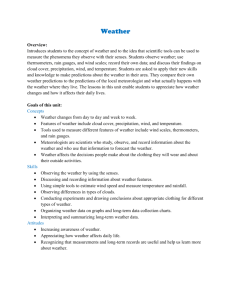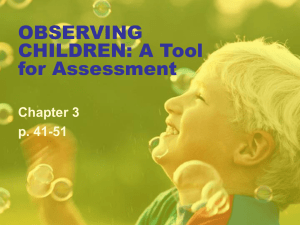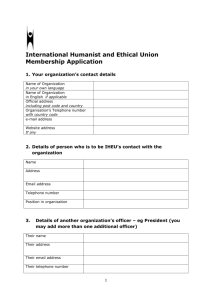PGCE pre- programme tasks- possible Induction programme
advertisement
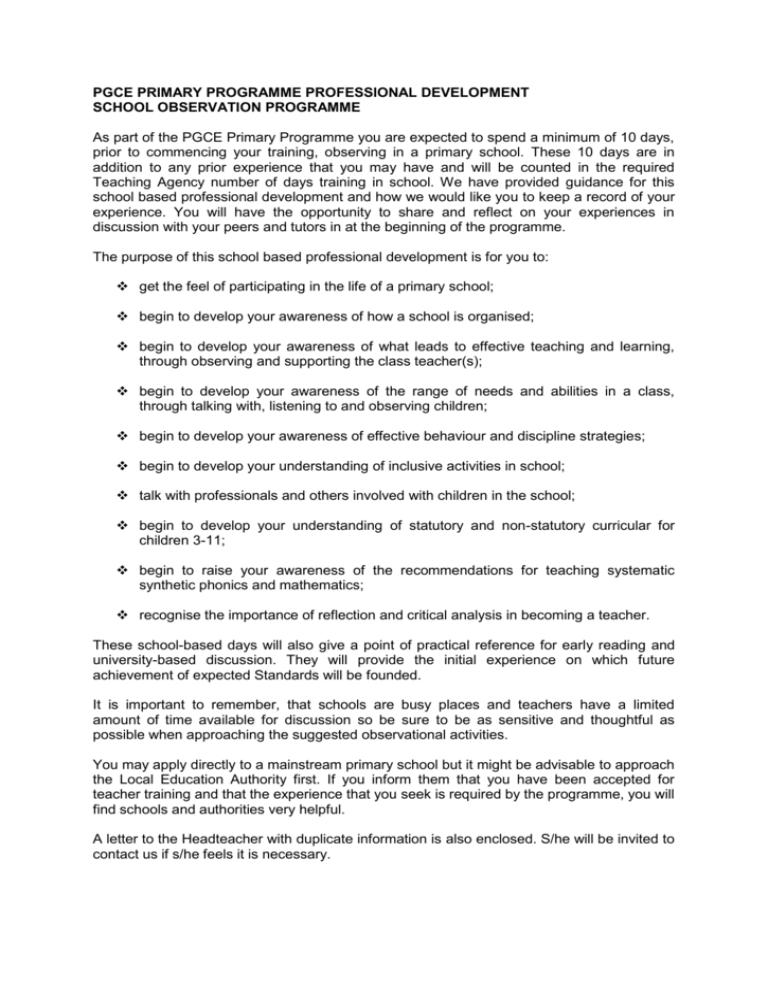
PGCE PRIMARY PROGRAMME PROFESSIONAL DEVELOPMENT SCHOOL OBSERVATION PROGRAMME As part of the PGCE Primary Programme you are expected to spend a minimum of 10 days, prior to commencing your training, observing in a primary school. These 10 days are in addition to any prior experience that you may have and will be counted in the required Teaching Agency number of days training in school. We have provided guidance for this school based professional development and how we would like you to keep a record of your experience. You will have the opportunity to share and reflect on your experiences in discussion with your peers and tutors in at the beginning of the programme. The purpose of this school based professional development is for you to: get the feel of participating in the life of a primary school; begin to develop your awareness of how a school is organised; begin to develop your awareness of what leads to effective teaching and learning, through observing and supporting the class teacher(s); begin to develop your awareness of the range of needs and abilities in a class, through talking with, listening to and observing children; begin to develop your awareness of effective behaviour and discipline strategies; begin to develop your understanding of inclusive activities in school; talk with professionals and others involved with children in the school; begin to develop your understanding of statutory and non-statutory curricular for children 3-11; begin to raise your awareness of the recommendations for teaching systematic synthetic phonics and mathematics; recognise the importance of reflection and critical analysis in becoming a teacher. These school-based days will also give a point of practical reference for early reading and university-based discussion. They will provide the initial experience on which future achievement of expected Standards will be founded. It is important to remember, that schools are busy places and teachers have a limited amount of time available for discussion so be sure to be as sensitive and thoughtful as possible when approaching the suggested observational activities. You may apply directly to a mainstream primary school but it might be advisable to approach the Local Education Authority first. If you inform them that you have been accepted for teacher training and that the experience that you seek is required by the programme, you will find schools and authorities very helpful. A letter to the Headteacher with duplicate information is also enclosed. S/he will be invited to contact us if s/he feels it is necessary. Observation in School THE ORGANISATION OF THE SCHOOL Over the ten days, as you become familiar with the school and have the opportunity to talk with the Headteacher and other members of staff, it would be useful to record information about the organisation of the school and its policies on Behaviour and Discipline; Child Protection and Communication and Language Development. Policy documents should be available for reference on the school web site. Organisation Adults: How many are there and what roles do they have? What responsibilities do the teachers have in addition to their general teaching duties? Do they have any special qualifications, experience or interest for these? What are the roles of other adults working in the classroom? What contact does the school have with support agencies, such as the educational welfare officer, social workers, and the school psychological service? Children: How many classes are there in the school? How many children attend the school? What is the catchment area? Do the children come from homogeneous social and cultural backgrounds? If not, what faiths, cultures and languages are represented in the school? What provision is made for children with English as an additional language? Does any work go on in languages other than English? What provision is there for children with special educational needs, e.g. children with disabilities, children with learning difficulties, children with exceptional abilities? Resources The Building: In what way does the building limit or enhance teaching opportunities? Are there sufficient facilities for games, PE and whole school assemblies? What is the provision for outside play? In what ways does the organisation of the playground encourage safe, enjoyable playtimes? Equipment: Are there any specialist resource areas in the school? How is the equipment for specific curriculum work, e.g. music, science, PE organised? ORGANISATION OF THE LEARNING ENVIRONMENT During your 10 days in school you should spend the majority of your time in your base class but also at least 1 day in the age phase prior to and after the ones for which you are training. Further guidance for experience in other age phases is given at the end of this documentation. In the class where you are going to spend most of your time make a simple plan of the classroom, indicating how the resources are organised, the layout of the furniture and any other features of interest. Observe and record the routine of the day. How does the class teacher start the day with the children? Does the layout of furniture change depending on the learning activity? Do the children have independent access to materials and resources? In what ways does the layout and organisation of your base class differ to a class in another age phase? THE CHILD'S DAY In negotiation with the class teacher, choose a child to focus on for a day. It would be helpful to observe a child who is working at an age appropriate level. The child should not know that you are observing them. You could work with them directly or with a group that they are in; have lunch alongside them and accompany the teacher-on-duty at playtime so that you can observe the child in the playground. Note how they respond in whole class sessions; how they respond to the range of activities they have been asked to engage in during the day (which may include both active and passive learning) and how they relate with their peers. Keep a diary of the day, recording moments and events that you regard as significant and, if possible, discuss your observations with the class teacher. OBSERVING AND SUPPORTING CHILDREN’S LEARNING WEEK 1 Task 1 Work with a group of children on an activity that has been organised under the guidance and supervision of the class teacher. The activity can be related to any area of the curriculum. Discuss beforehand the purpose of the activity and its relationship to the Early Years Foundation Stage Curriculum or the National Curriculum and prepare the resources. After the activity has finished, evaluate it briefly with the class teacher. What happened during the session? How would the class teacher record the achievements of the children? In what ways, if any, would you alter the session if you had the opportunity to do it again? Make a record of the activity from preparation to evaluation. Task 2 One of the areas of priority for the current government is the teaching of systematic synthetic phonics (SSP) and in light of this you need to undertake at least one observation of the teaching of phonics. An observation prompt sheet is enclosed which you will need to complete during the observed lesson and discussion with the class teacher. This observation will be reflected upon during an English phonics session in your first term. Task 3 Another area of priority is mathematics. It is therefore important to observe at least one maths lesson. An observation prompt sheet is provided to guide your observations. If possible, talk with the class teacher about the key aspects of calculation which children find most challenging in this year group; why this might be, and ways in which this might be addressed. We recommend that you take an active role in these observations in order to maximise your learning. Task 4 Communication and Language development It is important in primary school to develop a child’s communication and language skills. Children learn the conventions and rules involved in talk within a supportive classroom environment. This learning takes place in all areas of the curriculum. Over the period of a day observe how the class teacher encourages children to develop their ideas through talk: in pairs, groups and in whole class sessions with the teacher. What is the purpose of these activities e.g. discussion or exploration of a problem; sharing ideas; presentation? Is there evidence of a focus on language content and subject content e.g. explanation of subject specific vocabulary; key words displayed and modelled? How is questioning used and modelled? Write a reflective commentary on your observations (250 words) Task 5 When observing and working alongside children in class observe the range of behaviour and discipline strategies employed by teachers and link the practice observed to school policy. You may do this by annotating the policy document with examples of practice. OBSERVING AND SUPPORTING CHILDREN’S LEARNING WEEK 2 Task 1 Browse the books in the classroom perhaps with the guide of1/2 children to gain a sense of the range of material available for children and what they particularly enjoy reading. Task 2 Read aloud to group of children and write reflective notes on what the children gained from the session. In planning this session you may wish to: ask the teacher about an appropriate text. observe the type of texts the children in the class enjoy consider the size and make-up of your group and where the session will take place prepare for reading aloud (i.e. getting to know the book) Bring the reflective notes from this session to your first English class in Term1. Task 3 Identify a small group of children in KS1/2 to work with during a calculation lesson. During the oral and mental starter consider some of these questions: What mental strategies are they using? How confidently and effectively are they using them? Are they able to explain their thinking / strategy? What resources are they using and are they competent in their use? Work alongside the same children for the rest of the lesson. What mental strategies / written methods do they employ? How confident are they in their use? In Foundation Stage focus on a small group using number, consider the types of activities / resources which are supporting the children’s learning; the mathematical language these children are using, and how this supports conceptual understanding of number. Make notes on the mathematical knowledge and skills of the children in your group. In your notes, try to identify anything that you felt helped the children to succeed. For example, were they supported by any resources, or by making informal jottings? If so, HOW did these help them? Task 4 Talk to 2 children about their experiences, in school using the following prompt questions as a guide; What do you like/dislike about school? What do you think you are really good at in school? What do you think you could get better at? Who helps you to learn? If you could change anything about school what would you change? Note the children’s responses (making a transcript would be a helpful exercise for you) and write a brief summary of key points raised by the children. WEEK 1 and 2 Across both weeks you are expected to observe at least 2 other curriculum areas or areas of learning in the EYFS and for these observations you may consider the following: * What are the objectives for the lesson? * What teaching strategies are employed? * What is the teacher's role during the lesson? * What opportunities are there for the children to work collaboratively and independently? * How is the lesson resourced? Record your observations and reflect on what you have seen in the light of the above questions. An opportunity to talk with the teacher observed about their responses to government initiatives would be helpful. English as an Additional Language (EAL) Find out about the resources in the school which are available to support learners with EAL. Identify any learners with EAL in your base class; discuss and make notes on their learning needs with the class teacher. Special Educational Needs and/or Disabilities Identify any children in your base class who have special educational needs and/or disabilities. Discuss their learning needs with the class teacher. Observe strategies to support the children i.e. additional adult support; specialist input and intervention; peer support; additional resources; differentiated tasks. Knowledge of post and prior age phases All students train to teach in two consecutive age phases or Key Stages but these do not sit in isolation for the children who progress through them, nor for the teachers and other professionals who are responsible for teaching and learning within them. It is important therefore that students have opportunities to develop knowledge and understanding of the age phases prior to and following the ones for which they are training to teach. Across the phases students need to be aware of: the processes for transition; models of classroom organisation and behaviour management; strategies for intervention and support; curriculum organisation; the roles of teachers and other professionals and the management of resources. Suggested activities During the school based days students should: Find out about the strategies employed to manage transition effectively e.g. cross phase visits; Reflect on similarities and differences in the provision for learning across the age phases considering for example: approaches to classroom organisation e.g. ability groups; the range and use of resources to support teaching and learning; the roles of teachers and other colleagues. Record of School Based Training During your programme of study you will become aware of the importance of observing, recording and evaluating both your own experience and that of children. Perceptive, critical reflection and the ability to assess the educational significance of children's responses and attitudes play an important role in the education process. Your record of your school based Professional Development prior to induction is an introduction to a way of working that will be developed during your training. The notes that you keep should be informative, reflective and analytical rather than descriptive, thus creating the opportunity to raise questions about school organisation, teaching strategies and children's learning that can be addressed in more depth and with increasing understanding as the programme continues and you gain experience. Your portfolio should include: Classroom plan and information on the learning environment and resources (the latter may take the form of annotated photos). Reflective notes arising from experience in other age phases Diary of a child’s day Plan and evaluation of group activity Observation of maths and phonics lessons Reflective commentary on children’s communication and language development Annotated school behaviour and discipline policy Reflective notes from read aloud session Reflective notes on children’s mathematical knowledge and skills Children’s responses to questions about learning in school Reflective notes on the needs of children with EAL or SEND and strategies to support their development In addition, as you look ahead to your training we would like you to write brief reflective responses to the following questions, (500 words (max) per question): 1) What aspects of the curriculum are you excited about teaching and why? 2) To what extent was the learning in the school relevant for the children? 3) Would you describe your school as inclusive? What evidence do you have for your responses? The portfolio could also include examples of the children's work, snatches of children's conversations that have intrigued or surprised you, personal memories of your own schooling that have been triggered by the experience as well as policies and documents. Your portfolio will not be formally assessed but you will be required to share aspects of your learning with both your peers and your Professional tutor in an early tutorial at the start of your programme. Professional Conduct in school You will be a guest in a school and expected to respect the ethos and policy of the school. Each school is different and you must demonstrate an awareness of expectations of the school and behave in a professional manner. You should conform to the dress code, arrive punctually, be well prepared and willing to undertake tasks as requested. Health and Safety Ensure that you have read and comply with the school’s health and safety policy, including the fire regulations and that you are aware of children with specific medical needs. Interactions with individual pupils You are advised to consult school staff about the school’s policy e.g. keeping classroom door open. You are advised not to engage in close physical contact with a child, unless the child is losing control and needs to be restrained to prevent injury to self or others. You should not be alone with a child or children. Staff room You may be invited to join the staff in their shared room for breaks and you should consider time in the staff room as part of your developing professional experience. However, you should be aware that you are a guest within a staff room and respect the needs of all school staff. Mobile phones should be turned off in school. You should ensure that you pay for coffee, help with washing up cups etc.
